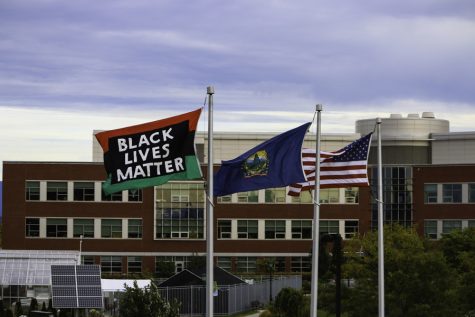BLM flag thief identified
April 19, 2017

On Saturday, Sept. 24, sophomore J.T. Reichhelm he stole the Black Lives Matter flag from outside the Davis Center, leaving his fingerprints for police to find, he said.
UVM police began investigating the theft Sunday morning and later identified Reichhelm as the thief, according to the police report.
Reichhelm, who was then pledging Phi Gamma Delta (FIJI), said he stole the flag while “blackout” drunk, prompting a police investigation into the fraternity, according to documents obtained by the Cynic.
“It was my own stupid drunken decision,” he said. “I never meant to make anyone feel unsafe or unwanted.”
The Black Lives Matter flag at UVM made national headlines in Fox News, the Huffington Post and the Washington Post when it was raised, stolen and then raised again.
SGA flew the Black Lives Matter flag Sept. 22 alongside the Vermont state and U.S. flags following the shootings of black men by police in Tulsa, Oklahoma and Charlotte, North Carolina.
The night of the theft, FIJI members discovered Reichhelm had stolen the flag after he posted a photo on Snapchat.
They called an emergency meeting the next evening and unanimously voted to expel him from the pledge class, the documents stated.
The following day, three unnamed FIJI members and their chapter adviser Peter Diederich reported Reichhelm to Pat Brown, director of student life, and Kim Monteaux De Freitas, director of fraternity and sorority life, the documents stated.
Pat Brown then reported the theft to UVM police, the documents stated.
Sgt. Mary Seller was dispatched to interview Reichhelm the morning of Sept. 28.
When Seller first asked Reichhelm about the flag, he denied involvement, according to her report.
“I explained to him I knew he had taken it, and there were two fingerprints lifted from the flagpole,” Seller stated in the report.
Reichhelm then confessed to stealing the flag, retrieved it from under his dorm room bed and helped Sgt. Seller fold it before she returned the flag to the police station, according to the report.
Bev Colston, director of the Mosaic Center for Students of Color, did not know the flag was stolen by a UVM student until last week, she said.
She was saddened, but not surprised, to hear the thief was a member of UVM’s community, she said.
“Learning that it was a former FIJI pledge was brand new to me,” Colston said.
Administrative bodies at the University, including those in student life and fraternity and sorority life, knew who stole the Black Lives Matter flag as soon within two days of the Sept. 25 theft, the documents stated.
Annie Stevens, vice provost for student affairs, said she participated in other conversations in February about whether or not to release information about the thief’s identity.
It was decided that there was no way to keep Reichhelm’s identity private if they released information regarding who stole the flag, Stevens said.
Nestor said that privacy laws, which prevent the University from identifying individuals in student conduct cases, sometimes put the University in a situation where it’s unable to comment on issues that impact the community.
“It puts us in a very awkward position time and again,” Nestor said. “Other people can talk about what they know about. We have to remain in this posture of no comment, which looks suspicious on the surface.”
After Sgt. Seller interviewed Reichhelm on Saturday’s events, she said she was able to gain information that there may have been some hazing at the fraternity that night, according to police reports.
During Seller’s interview, Reichhelm said he was “the most drunk he had ever been.”
He said he had gotten drunk because some FIJI members had pressured him to drink. Reichhelm accused the fraternity of hazing, the police report stated.
Reichhelm walked down to the FIJI house Saturday with fellow sophomore pledge Mike Hoaglund, he said.
Reichhelm told investigating officer Denise D’Andrea that some members poured a large amount of alcohol into the cooking pot and told he and Hoaglund to drink it.
Reichhelm noted that he was not forced to drink, but that if he did not, another pledge would have to finish the drink for him, according to the police report.
“It would be like punishing ourselves if we did not drink,” Reichhelm said in the interview with D’Andrea. “You want to be friends with them and to be a part of them, so this is the way you do it.”
In his statement, Reichhelm told D’Andrea that the night before, he and nine other pledges had lined up in the basement of a FIJI member’s apartment and passed the pot of alcohol from pledge to pledge until it was empty.
A third pledge stated that members had “stressed that if anyone did not want to do this they did not have to,” according to documents obtained by the Cynic.
On April 14, Reichhelm said he acted alone in stealing the flag in September.
Reichhelm said he remembered getting a call from FIJI members after he stole the flag, he said. Later, they told him that they had to drop him, Reichhelm said.
Members told Reichhelm that turning himself in would help the fraternity, as the organization could not be tied to “the flag drama,” Reichhelm said.
After Reichhelm stole the original flag, Brown and his wife Amy sewed a new flag with the Black Lives Matter flag on a pan-African flag.
“I’m really proud of the response from the institution, from SGA, Pat Brown and his wife,” said Colston, reflecting on the University’s original decision to fly the flag and Brown’s replacement after the first was stolen.
“I’m really grateful we did something that was groundbreaking and much more forward than any other institution in this country,” she said.
The University announced the results of the hazing investigation in a March 30 press release. FIJI was suspended for four years as a result of the police investigation.
If an establishment is using drinking games to distinguish membership, it is considered hazing, he said.
“Optional means nothing to us,” Dean of Students David Nestor said.
Nestor said the stolen Black Lives Matter flag and FIJI’s hazing violations were two separate issues.
The first issue which police investigated was an individual’s theft of the flag. The second issue was an organization that was hazing its members, he said.
Nestor said at the end of the investigation, it was clear the individual acted on his own and not as a part of a larger organization. Nestor said he was unable to identify the individual or comment on his punishment due to student privacy laws.
The University denied FIJI’s appeal to have sanctions removed.
SGA President Jason Maulucci said he was upset with the University’s decision to sanction the fraternity even after they had turned the pledge in.
“It doesn’t exactly send the right signal that in doing the right thing, they were punished,” Maulucci said. “What the individual did was despicable, but I’m thankful FIJI did the right thing.”






